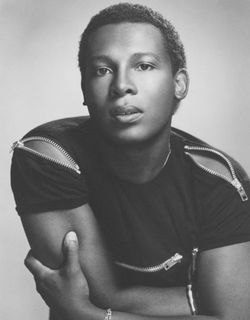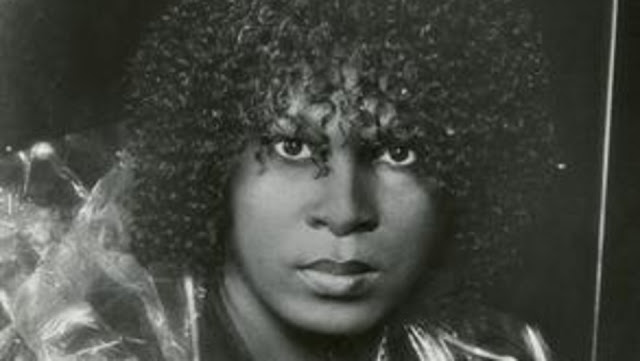Tonight's
meal is to honor a black LGBT hero and performer known as Sylvester.
He was called the Queen of Disco. Read more about him after the
recipe.
Here
is a basic hearty meal that does not cost much. The type of meal
that sustained many a young performer trying hard for their big
break. Caned White beans, some bacon, a little onion and carrots
makes a filling and heart warming meal.
Ingredients:
12
oz. bacon, chopped into small pieces
1Tbs
butter
2
tsp Italian seasoning
Pinch
or two sea salt + ½ tsp pepper
6
(15 oz.) cans small white beans or navy beans, drained and rinsed
4
cups Swanson chicken stock, hot
2
Tbs flat-leaf parsley, chopped optional
Instructions:
Chop
up the vegetables. Here slave tried a batch of already chopped
vegetables from the produce section. Cut up the bacon into tiny
pieces.
Cook
the bacon in a Dutch oven, in a drizzle of olive oil, then remove
with a slotted spoon, drain on a paper towel, and set aside. Reserve
1 tablespoon of the bacon fat.
In
a sauce pan heat up the chicken stock.
Add
olive oil and butter into the pot along with the bacon fat, allow
them to melt together.
Add
in the diced onion, carrots and celery, and allow them to soften and
saute for about 5
minutes. Scrape
the bottom of the pot as you stir. This uses the bits that would
otherwise be lost and can take a chisel to get out of the pot latter.
Add
in about 2/3 of the reserved, crisped bacon, as well as the Italian
seasoning, the sea salt and the pepper, along with the white beans,
and stir to combine.
Pour
in the hot chicken stock, stir, and allow the stew to gently
simmer
for about 45-50
minutes,
partially covered.
Now
mash the beans a little bit with the back of your spoon, to break
them up and release their natural starch to thicken the stew.
After
another half hour,
turn the heat off and finish the stew by adding the rest of the bacon
as a garnish.
Serve
with a bread to soak up every tasty drop!
For
our music: https://www.youtube.com/watch?v=bDWSemTCV40
So
happy to be serving my Master Indy on this Valentine's Day!
socialslave
To
satisfy and restore.
To
nourish, support and maintain.
To
gratify, spoil, comfort and please,
to
nurture, assist, and sustain
…..I
cook!
Please
buy slave's cookbook:
The
Little Black Book of Indiscreet Recipes by Dan White
http://www.amazon.com/dp/B00F315Y4I/ref=cm_sw_r_tw_dp_vAT4sb0934RTMvia @amazon
========================
Sylvester
Sylvester James Jr.
(September 6, 1947 – December 16, 1988), who used the stage
name of Sylvester, was
an American singer-songwriter. Primarily singing disco, rhythm &
blues, and soul, he was known for his flamboyant and androgynous
appearance, falsetto singing voice, and hit disco singles in the late
1970s and 1980s. Sylvester was responsible for a string of hit
singles in the late 1970s and became known in the United States under
the moniker of the “Queen of Disco.”
Born in Watts, Los
Angeles, to a middle-class African-American family, Sylvester
developed a love of singing through the gospel choir of his
Pentecostal church. Forced to leave both his church and his family
after arguments and disapproval of his homosexuality,
Now homeless in 1962,
Sylvester spent much of the next decade staying with friends and
relatives, in particular, his grandmother Julia, who expressed no
disapproval of his homosexuality, having been a friend of a number of
gay men in the 1930s. At age 15, he began frequenting local gay clubs
and built up a group of friends from the local gay black community,
eventually forming themselves into a group which they called the
Disquotays.
Sylvester's best friend among the Disquotays was a trans woman named
Duchess, who earned her money as a prostitute, a job that Sylvester
refused to engage in. The group held lavish house parties, sometimes
without permission at the home of their friend, rhythm and blues
singer Etta James, in
which they dressed up in female clothing and wigs, constantly trying
to outdo one another in appearance.
Sylvester's
boyfriend during the latter part of the 1960s was a young man named
Lonnie Prince; well-built and attractive, many of Sylvester's friends
described the pair as being "the It couple". Sylvester
often hitchhiked around town while in female dress; such activity
carried a risk of arrest and prosecution, for cross-dressing was then
illegal in California. Although avoiding imprisonment for this crime,
he was arrested for shoplifting on several occasions. He found work
in a variety of different professions. In the 1960s, the Civil Rights
Movement was at its peak, but Sylvester and his friends did not take
an active role within it.
Although
he had little interest in formal education and rarely attended
classes, Sylvester was enrolled at Jordan High School. He graduated
in 1969 at the age of 21; in his graduation photograph, he appeared
in drag wearing a blue chiffon prom dress and beehive hairstyle. By
the end of the decade, the Disquotays had begun to drift apart.
Sylvester always considered himself male and began to tone down the
feminine nature of his clothing, aiming for a more androgynous look
which combined male and female styles and which was influenced by the
fashions of the hippie movement.
Moving to San Francisco
in 1970 at the age of 22, Sylvester embraced the counterculture and
joined the avant-garde drag troupe The Cockettes, producing solo
segments of their shows which were heavily influenced by female blues
and jazz singers like Billie Holiday and Josephine Baker. During the
Cockettes' critically panned tour of New York City, Sylvester left
them to pursue his career elsewhere. He released two commercially
unsuccessful albums as Sylvester and his Hot Band on Blue Thumb
Records in 1973 before disbanding.
Focusing on a solo career,
Sylvester signed a recording contract with Harvey Fuqua of Fantasy
Records. His first solo album, Sylvester
(1977), was a moderate success.
Sylvester's
fame increased following the release of his solo album, and he was
employed to perform regularly at The Elephant Walk gay bar in the
Castro, an area of San Francisco known as a gay village. He became a
friend of Harvey Milk—known locally as the "Mayor of Castro
Street"—who was the first openly gay man to be elected to
public office in California, and performed at Milk's birthday party
that year. In the spring of 1978, Sylvester successfully auditioned
for a cameo appearance in the film The Rose starring gay icon Bette
Midler. In the film, he plays one of the drag queens singing along to
Bob Seger's "Fire Down Below," in a single scene that was
filmed in a run-down bar in downtown Los Angeles This was followed
with the acclaimed disco album Step II (1978), which spawned the
singles "You Make
Me Feel (Mighty
Real)" and "Dance
(Disco Heat)", both of which were hits in the U.S. and Europe.
During the late 1970s,
Sylvester gained the moniker of the "Queen of Disco" and
during his life he attained particular recognition in San Francisco,
where he was awarded the key to the city.
He then signed to Megatone
Records, the dance-oriented company founded by friend and
collaborator Patrick Cowley,
where he recorded four more albums, including the Cowley penned hit
Hi-NRG track "Do Ya Wanna Funk."
An activist who campaigned
against the spread of HIV/AIDS, Sylvester died from complications
arising from the virus in 1988, leaving all future royalties from his
work to San Francisco-based HIV/AIDS charities.
In 2005,
he was posthumously inducted into the Dance Music Hall of Fame, while
his life has been recorded in a biography and made the subject of
both a documentary and a musical.
Shortly before his death
Sylvester had bequeathed his future royalties of his music to local
AIDS groups, but Sylvester died deeply in debt there was no
money to distribute until the late 1990’s. Once his advances were
repaid, his early-career label Fantasy Records then kept the money in
an account until its proper recipient could be legally determined.
In 2010 The AIDS Emergency
Fund and Project Open Hand split a check from Sylvester’s estate
totaling nearly $140,000.














No comments:
Post a Comment